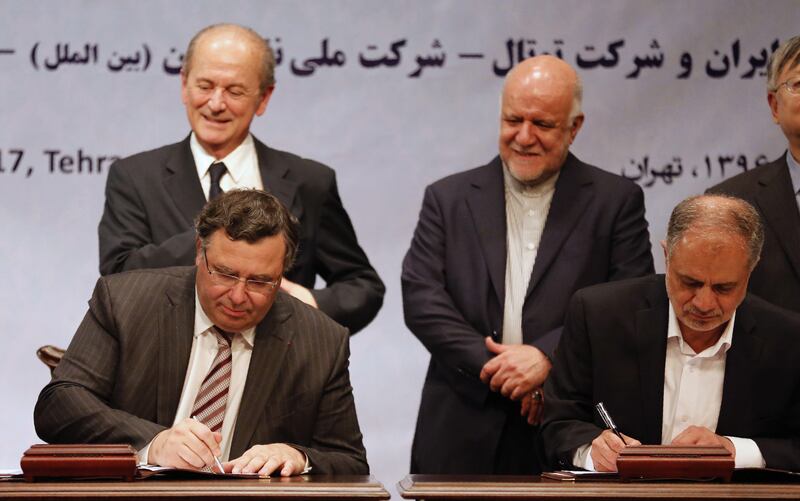Total has made a US$1 billion bet on natural gas in Iran, swallowing a hefty dose of political risk in the hope of gaining first-mover advantage in the country with the world’s largest reserves.
The deal to develop phase 11 of the giant South Pars field is the first investment in Iran by an international energy company since sanctions were eased last year. Total expects it to open the way for further involvement in oil, gas and petrochemical projects there, said chief exeuctive Patrick Pouyanne.
It also gives the French energy producer a high profile in a country that is at the centre of multiple geopolitical flashpoints, where many of its peers are still wary of treading.
“It’s a long commitment to Iran,” Mr Pouyanne said on Monday in Tehran as he signed the 20-year agreement. “I will come back to Iran again because this contract is the first of many."
The Middle Eastern country – also Opec’s third-largest crude producer – is a tempting destination for foreign capital as it seeks to boost output after years of international restrictions. While Mr Pouyanne has highlighted the benefit of getting in first, the deal also makes Total potentially vulnerable to an escalating regional diplomatic crisis and US president Donald Trump’s hostility to the nuclear deal that enabled the country’s reopening.
Total, which has little exposure to the US shale boom that is reshaping global gas markets, is looking around the world for competitive fields. It has some in-built advantages in Iran.
The company knows the country well, having worked on South Pars until tightening restrictions on trade and investment forced it to withdraw in 2009. The French producer also has experience navigating sanctions elsewhere, including Russia, where it has a 20 per cent stake in a giant project to produce liquefied natural gas in the Arctic.
“There are a lot of companies that want to come back in Iran, including Shell and Eni,” said Ahmed Ben Salem, an analyst at Oddo Securities, said by phone. “Being a first mover in the area, having kept its office open, is very well regarded by local authorities. Total will be well placed to benefit from potential new projects.”
Total has moved further and faster than its peers, none of whom have agreed on an investment on the scale of South Pars.
In December, Royal Dutch Shell Plc signed a preliminary agreement to assess three of Iran’s largest oil and gas resources. Last month, Eni agreed to study development of the Kish and Darkhoein fields. BP Plc is reluctant to go into a country on which the U.S. still has some restrictions, while American companies remain unable to invest there, Ben Salem said.
“For Total, $1 billion isn’t huge” so the financial risks remain relatively low, Homayoun Falakshahi, a senior research analyst at Wood Mackenzie Ltd., said by phone. “The political risks are hard to predict as long as Trump remains at the White House.”
Pouyanne is among oil-company bosses ramping up spending on natural gas, saying last month that such investments are more “interesting” than coal as global warming forces changes in the energy mix.
Iran holds the world’s largest gas reserves, estimated by BP at 1,183 trillion cubic feet, or almost four times the amount held by the U.S. Its oil production climbed 33 percent to about 3.7 million barrels a day last year after sanctions were eased in January 2016, according to data compiled by Bloomberg.
Under the contract signed Monday, Total holds 50.1 percent of phase 11 of South Pars, which along with Qatar’s North Field comprises the world’s largest single accumulation of gas. The first phase will cost an estimated $2 billion, with production capacity of 2 billion cubic feet a day -- equivalent to about 10 percent of the country’s 2016 production -- supplying the domestic market starting in 2021.
*Bloomberg





